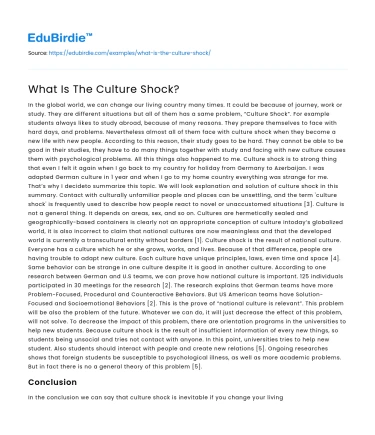In the global world, we can change our living country many times. It could be because of journey, work or study. They are different situations but all of them has a same problem, “Culture Shock”. For example students always likes to study abroad, because of many reasons. They prepare themselves to face with hard days, and problems. Nevertheless almost all of them face with culture shock when they become a new life with new people. According to this reason, their study goes to be hard. They cannot be able to be good in their studies, they have to do many things together with study and facing with new culture causes them with psychological problems.
All this things also happened to me. Culture shock is to strong thing that even I felt it again when I go back to my country for holiday from Germany to Azerbaijan. I was adapted German culture in 1 year and when I go to my home country everything was strange for me. That’s why I decideto summarize this topic. We will look explanation and solution of culture shock in this summary.
Save your time!
We can take care of your essay
- Proper editing and formatting
- Free revision, title page, and bibliography
- Flexible prices and money-back guarantee
Contact with culturally unfamiliar people and places can be unsettling, and the term 'culture shock' is frequently used to describe how people react to novel or unaccustomed situations [3]. Culture is not a general thing. It depends on areas, sex, and so on. Cultures are hermetically sealed and geographically-based containers is clearly not an appropriate conception of culture intoday’s globalized world, it is also incorrect to claim that national cultures are now meaningless and that the developed world is currently a transcultural entity without borders [1]. Culture shock is the result of national culture. Everyone has a culture which he or she grows, works, and lives.
Because of that difference, people are having trouble to adapt new culture. Each culture have unique principles, laws, even time and space [4]. Same behavior can be strange in one culture despite it is good in another culture. According to one research between German and U.S teams, we can prove how national culture is important. 125 individuals participated in 30 meetings for the research [2]. The research explains that German teams have more Problem-Focused, Procedural and Counteractive Behaviors. But US American teams have Solution-Focused and Socioemotional Behaviors [2]. This is the prove of “national culture is relevant”.
This problem will be also the problem of the future. Whatever we can do, it will just decrease the effect of this problem, will not solve. To decrease the impact of this problem, there are orientation programs in the universities to help new students. Because culture shock is the result of insufficient information of every new things, so students being unsocial and tries not contact with anyone. In this point, universities tries to help new student. Also students should interact with people and create new relations [5]. Ongoing researches shows that foreign students be susceptible to psychological illness, as well as more academic problems. But in fact there is no a general theory of this problem [5].
Conclusion
In the conclusion we can say that culture shock is inevitable if you change your living place. The best way against that is to search more about new culture which we will face, and we should have more communication with person who is from new culture. It will help to adapt easier to new culture.
References
- P. J. Witchalls, 'Is national culture still relevant?,' interculture journal , vol. 11, 2012.
- N. Lehmann-Willenbrock, L. A. Meinecke and . A. A. Joseph, 'Observing culture: Differences in U.S.- American and German team meeting behaviors,' Group Processes & Intergroup Relations, vol. 17, pp. 252-271, 2013.
- S. Bocher, Culture Shock Due to Contact with Unfamiliar Cultures, Online Readings in Psychology and Culture, 2003.
- E. T. Hall and M. R. Hall, 'Underlying Structures of Culture,' Understanding Cultural Differences, vol. 1, 1990.
- A. Furnham, ' Education and culture shock,' The Psychologist, vol. 17, pp. 16-19, 2004.






 Stuck on your essay?
Stuck on your essay?

